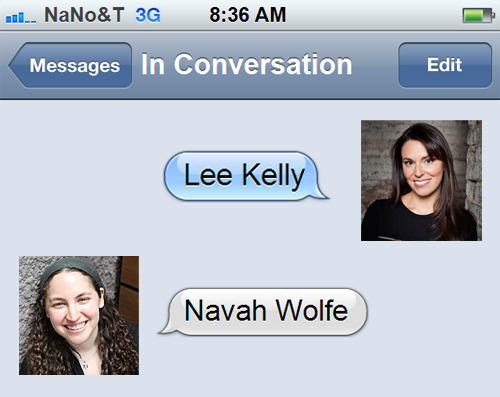The Author/Agent Conversations: Why the "Iceberg Theory" Is Key to World-building

As the "Now What?" Months continue, we’ll be hearing from agents, editors, self-publishers, and authors about the road towards sharing your work. We’ve asked several authors to interview their agents for a peek behind the curtain at what it takes to write and sell a book. Today, Lee Kelly talks with her editor, Navah Wolfe, about world-building, collaboration, and the iceberg theory:
Navah Wolfe (Editor at Simon & Schuster’s Saga Press): What was the most challenging part of our editorial process for you?
Lee Kelly (Author, City of Savages): I think letting go of my book in its previous form, and really digging in and doing the full-scale revisions the book needed to get to that next level. I knew the book so well that I could recite certain parts of it, so it felt so odd and unsettling to rework substantial portions that had been static for so long.
Navah: What about the most fun part?
Lee: Ironically, it was those “gut renovations”—where I really stripped parts of the novel and rebuilt them from the ground up again—that ended up being the most fun! I feel like I learned so much as a writer from the process.
We had a lot of touch points during our revisions—frequent calls and emails—, which was incredibly helpful for me in terms of brainstorming story and plot, and made me feel like I really had a partner during this (sometimes scary) process! Is this “collaborative” style typical for you as an editor?
Navah: I try to follow my authors’ leads for this one. Some of my authors prefer to take their edit letter, hide in their revision cave, and come out a month later with a new draft. If that works for you, that’s awesome.
But for the authors who are interested, I very much believe in making the revision process a conversation. I am always available to discuss revision ideas, either over email or over the phone. I think any job, especially a creative one, thrives on collaboration, and especially when you’re struggling with a thorny edit, it can be immensely helpful to talk it out.
I don’t always have all the answers from the start, but I often find that when I have an editorial conversation with an author, by the time we get off the phone we’ve tossed enough ideas around that we’ve found the solution—and that feels great.
Lee: What about your edit letter process? What does that first letter you send to an author typically include?
Navah: Generally I like to do a micro-edit and a macro-edit at the same time. I focus on big picture problems:
Does this plot point make sense?
Is this character acting like himself?
Is the plot arc satisfying?
Does this backstory work?
But I also look at smaller, line-by-line issues. I find that doing a line edit, even on a first draft, can help hone in on specific examples of the big picture problems, and draw a map to fix them.
Lee: Is there a particular aspect of story that you think you focus on the most on when you’re editing a novel?
Navah: I’m a big believer in solid world-building—whether it’s in fantasy, science fiction, or even contemporary fiction! No matter what kind of book you’re writing, a solidly established setting will inform the tone of the entire novel. And I generally assume that the writer knows a lot more about it than ends up on the page, so if something’s missing, it’s not because the writer doesn’t know what it is, it’s because it’s not translating properly.
It’s what I like to call the iceberg theory—it’s all there under the surface, and it’s my job as an editor to help the writer tease it out so readers can see it, too.
Lee: And I love that term: the iceberg theory. That was a great guiding principle for my revisions—especially the last third where things get… sinister, to say the least! Bad guys need a backstory, too.
Lee Kelly has wanted to write since she was old enough to hold a pencil. An entertainment lawyer by trade, Lee has practiced law in Los Angeles and New York. She lives with her husband and son in Millburn, New Jersey. Her first novel, City of Savages, is forthcoming from Simon & Schuster in Spring 2015.

Navah Wolfe is an editor at Saga Press, Simon & Schuster’s imprint publishing fantasy and science fiction that appeals to teens and adults. Navah loves books with characters that steal your heart, and stories that stay with you long after the last page is turned. She is always on the lookout for fresh, innovative genre fiction, character-driven novels with a commercial hook, clever, gorgeous books that get under your skin, and stories that make us question our place in the world.
Chris Baty's Blog
- Chris Baty's profile
- 62 followers




